Elon Musk’s Starlink satellite service being used at Gaza hospital
The high-speed internet will enable potentially life-saving medical consultations via real-time video calling

Your support helps us to tell the story
From reproductive rights to climate change to Big Tech, The Independent is on the ground when the story is developing. Whether it's investigating the financials of Elon Musk's pro-Trump PAC or producing our latest documentary, 'The A Word', which shines a light on the American women fighting for reproductive rights, we know how important it is to parse out the facts from the messaging.
At such a critical moment in US history, we need reporters on the ground. Your donation allows us to keep sending journalists to speak to both sides of the story.
The Independent is trusted by Americans across the entire political spectrum. And unlike many other quality news outlets, we choose not to lock Americans out of our reporting and analysis with paywalls. We believe quality journalism should be available to everyone, paid for by those who can afford it.
Your support makes all the difference.Elon Musk has said his Starlink satellite internet service is now active in a hospital in Gaza.
The billionaire announced the news on his social media platform X, formerly Twitter, saying it had been made possible thanks to the help of the United Arab Emirates (UAE) and Israel.
It comes more than five months after the Israeli government approved Starlink's use in the hospital in the southern Gaza city of Rafah. Internet connectivity in Gaza is poor because of the lack of power and fuel to operate provider centres. This makes it much harder for medical staff and rescue teams to work.
Sheikh Abdullah bin Zayed al-Nahyan, the UAE’s foreign minister. thanked Musk for supporting the UAE field hospital in Gaza, “where many medical facilities have been destroyed in over nine months of war.“
The high-speed internet will enable potentially life-saving medical consultations via real-time video calling, the UAE foreign ministry said in February.

Gaza’s residents rely heavily on the internet to communicate with each other and with NGOs. According to a local expert quoted by a source at The Intercept, internet access declined by 80 per cent to 90 per cent within a few weeks of the war breaking out.
The war in Gaza was triggered by a Hamas attack inside southern Israel during which around 1,200 people were killed and another 250 were taken hostage, according to Israeli totals. In response, Israel launched an air and ground offensive and a blockade, which health officials in the Hamas-run strip say has killed more than 39,000 people.
Starlink’s arrival in Gaza is the latest reflection of the growing geopolitical influence that Musk wields through his fast-growing satellite business, which is part of his SpaceX business. He met Israeli prime minister Benjamin Netanyahu in Jerusalem at the end of last year to secure the approval of Starlink’s use.
Meanwhile, Gaza health officials said Israeli military strikes had killed at least 80 Palestinians in the Khan Younis area of southern Gaza since Monday.
Join our commenting forum
Join thought-provoking conversations, follow other Independent readers and see their replies
Comments